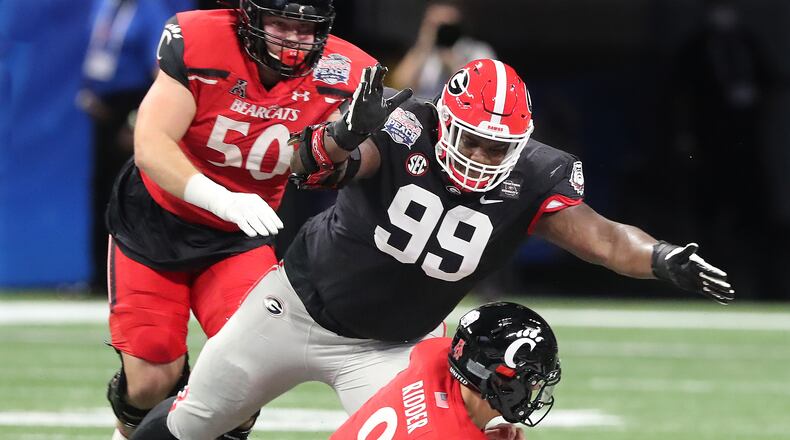It would have been a better story, nationally if not locally, had Cincinnati won. Then we could have plunged headlong into the debate over an expanded playoff and the unbeaten Bearcats could have anointed themselves the national champs of … well, something. (Note the mileage Central Florida got when it did.) That blast of air you felt when Jack Podlesny’s 53-yard field goal sailed true was in fact two separate gusts.
First, it was those rooting for the underdog – the underdog always being the catchier tale – sighing over their list of Talking Points getting shredded. Second, it was the Georgia Bulldogs allowing themselves to exhale.
The Chick-fil-Peach Bowl was pretty much a setup. The Bulldogs entered knowing they could prove nothing we didn’t already know. Namely, that a good Power 5 team will almost always beat the absolute best non-Power 5 team. Apart from the game being played 71 miles from Sanford Stadium, the intangibles all fell on Cincinnati’s side. The Bearcats had way more to prove. To the credit, they came darn close to proving it.
Say this, though: Given the chance to supply SEC naysayers with enough firewood to warm them through several winters, the Bulldogs hunkered down and righted a New Year’s Day going wrong. Down 21-10 inside the final 14 minutes, they won 24-21. It took a while, but their weight of numbers finally inundated the pride of the American Athletic Conference. Cincinnati was held to 28 yards and three first downs over its final seven possessions.
Say this, too: In the end, Kirby Smart outflanked Luke Fickell. The Georgia coach chose to punt with 3:07 remaining while trailing by two. If Cincinnati makes two first downs, we’re stacking that punt on the same shelf of infamy reserved for the failed fake punt on fourth-and-11 against Alabama in this same Mercedes-Benz Stadium in 2018. (The hapless ballcarrier that day was Justin Fields. It was his final snap as a Bulldog.)
With the game in its hands, Cincinnati made one first down. It was two yards from a second with 1:41 left and Georgia out of timeouts. (Afterward, Smart second-guessed himself, saying: “Looking back, maybe we should have gone for it.”) Fickell, the Bearcats’ coach, faced a decision of his own: A running play, even if it didn’t gain the needed yardage, would have taken the clock inside the final minute. Fickell opted to throw, even though Desmond Ridder hadn’t thrown for a first down in the second half.
Receiver Michael Young popped open. Georgia’s Tyrique Stevenson closed the distance and, without quite knowing where the ball was, knocked it to the turf. “Play of the game,” Smart said. “If they complete that, we don’t have a chance to win.”
Also: “I always believe if you’ve got momentum in stopping people … I felt confident that we could stop them with our timeouts.”
The incompletion meant Georgia took the ball with 1:28 remaining. J.T. Daniels, the USC transfer who didn’t make his first Georgia appearance until the season’s seventh game, completed five consecutive passes, three to tailback Kenny McIntosh. That brought the ball to the Cincinnati 36. Podlesny’s career long was 51 yards. This would come from 53 yards. This also would be the first game-winning kick of his life.
“I tried to slow my breathing,” Podlesny said. “I didn’t want to rush anything, didn’t want to overcorrect anything.”
His kick looked good and was, leaving Fickell to field the questions about game management. The Bearcats twice snapped the ball inside the final two minutes with several seconds left on the play clock. The incompletion on third-and-2 will long be a point of contention over plates of Skyline Chili in the Queen City. Fickell’s response to a query about throwing at such a moment: “Is that really … are you serious? We wanted to win the game.”
His Bearcats gave it a go, but the better team won. Georgia outgained its opponent 449 yards to 305. It sacked Ridder eight times. The unblockable Azeez Ojulari had three sacks and forced two fumbles. His first strip/sack came on the third play of the fourth quarter and changed the game; the second came on the final play and yielded a safety.
Many wondered if Ojulari, a draft-eligible sophomore, would bother with the bowl. Had he opted out, Georgia would have lost. Said Ojulari, the game’s defensive MVP: “It was important for me to just to make sure the seniors go out the right way. They worked so hard in this unpredictable season. You never know. I just got the opportunity to play for another game, so I took advantage of it, to play with my brothers. It was great.”
Thus did Georgia’s COVID-19 season end on a fairly giddy note. Its best victory – though not, Smart noted, its best performance – came in a game that many figured Georgia might pull a no-show. (The memory of the uninspired Sugar Bowl loss to Texas still lingers.) “We knew what the narrative was –that we didn’t want to be here, that our guys didn’t want to practice,” Smart said. “That was never true. Our guys practiced hard. They played a really good motivated team that was trying to stay undefeated.”
He was asked if this hairbreadth victory would send the Bulldogs into their offseason on a high. “I would not feel any different, but the perception would certainly be different all based off two more yards or less, however far (Podlesny’s game-winner) cleared it by.”
Had the Bulldogs lost to Cincinnati, they never would have heard the end of it. Winning, however, makes a powerful silencer. The offseason ahead should be nice and quiet.
About the Author
The Latest
Featured


